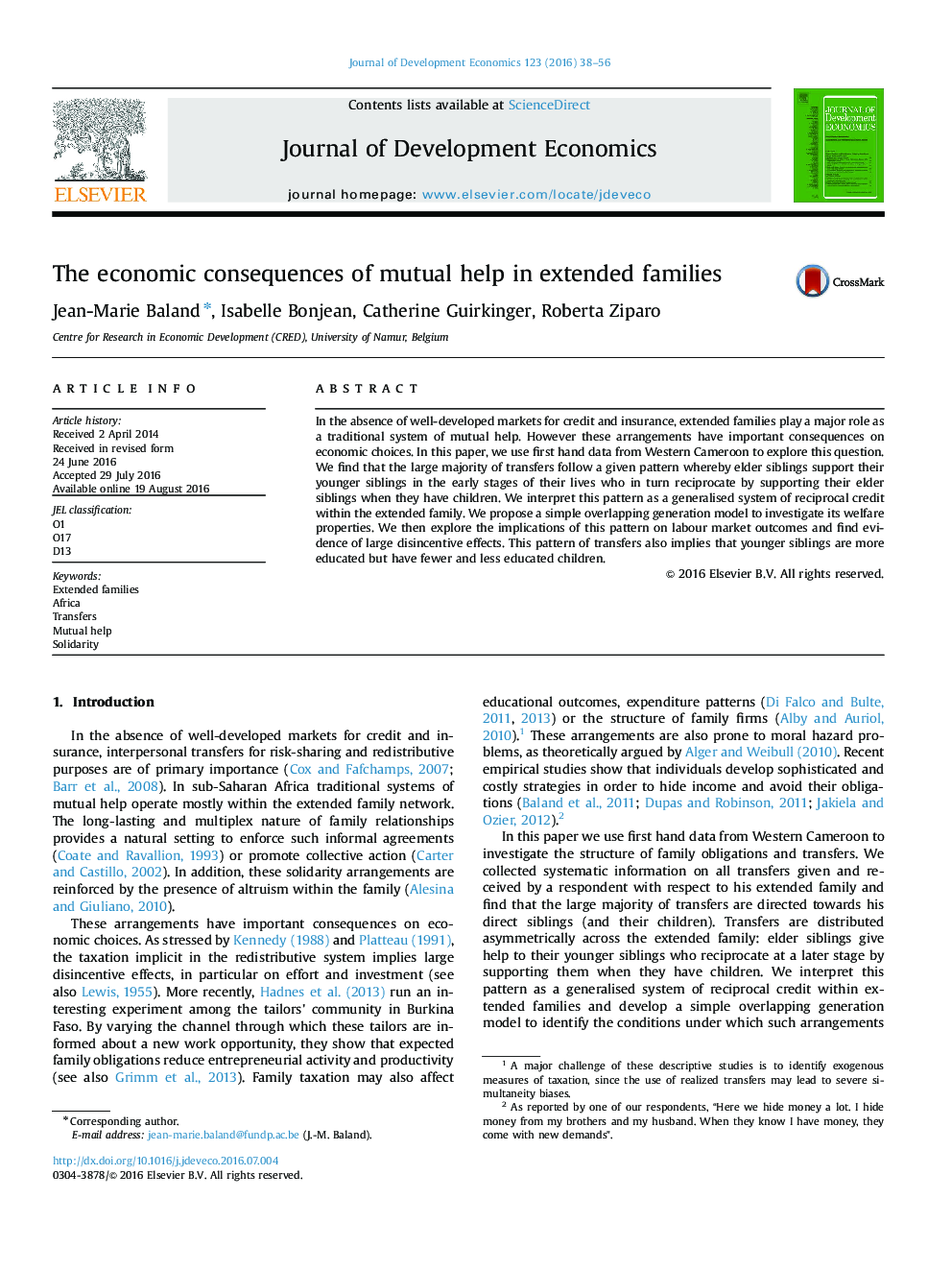| کد مقاله | کد نشریه | سال انتشار | مقاله انگلیسی | نسخه تمام متن |
|---|---|---|---|---|
| 5094232 | 1478488 | 2016 | 19 صفحه PDF | دانلود رایگان |
عنوان انگلیسی مقاله ISI
The economic consequences of mutual help in extended families
ترجمه فارسی عنوان
پیامدهای اقتصادی کمک متقابل در خانواده های گسترده
دانلود مقاله + سفارش ترجمه
دانلود مقاله ISI انگلیسی
رایگان برای ایرانیان
کلمات کلیدی
ترجمه چکیده
در غیاب بازارهای پیشرفته برای اعتبار و بیمه، خانواده های گسترده ای به عنوان یک سیستم سنتی از کمک متقابل نقش مهمی ایفا می کنند. با این حال این توافقنامه پیامدهای مهمی در انتخابات اقتصادی دارد. در این مقاله، از داده های دست اول از کامرون غربی برای کشف این سوال استفاده می کنیم. ما متوجه می شویم که اکثریت بزرگی از نقل و انتقالات به یک الگوی خاصی می رسند که برادران بزرگتر آنها را در مراحل اولیه زندگی خود حمایت می کنند و با حمایت از خواهران و برادران بزرگترشان در زمان کودکی متولد می شوند. ما این الگو را به عنوان یک نظام عمومی تعمیم یافته اعتبار متقابل در میان خانواده گسترده تفسیر می کنیم. ما یک مدل نسل تطبیق ساده را برای بررسی خواص رفاهی آن پیشنهاد می کنیم. سپس، نتایج این الگو را بر نتایج بازار کار بررسی می کنیم و شواهدی از اثرات تخریب بزرگی پیدا می کنیم. این الگوی انتقال نیز نشان می دهد که خواهر و برادر جوان تر تحصیل کرده تر هستند، اما کودکان کمتر و کمتر تحصیل کرده اند.
موضوعات مرتبط
علوم انسانی و اجتماعی
اقتصاد، اقتصادسنجی و امور مالی
اقتصاد و اقتصادسنجی
چکیده انگلیسی
In the absence of well-developed markets for credit and insurance, extended families play a major role as a traditional system of mutual help. However these arrangements have important consequences on economic choices. In this paper, we use first hand data from Western Cameroon to explore this question. We find that the large majority of transfers follow a given pattern whereby elder siblings support their younger siblings in the early stages of their lives who in turn reciprocate by supporting their elder siblings when they have children. We interpret this pattern as a generalised system of reciprocal credit within the extended family. We propose a simple overlapping generation model to investigate its welfare properties. We then explore the implications of this pattern on labour market outcomes and find evidence of large disincentive effects. This pattern of transfers also implies that younger siblings are more educated but have fewer and less educated children.
ناشر
Database: Elsevier - ScienceDirect (ساینس دایرکت)
Journal: Journal of Development Economics - Volume 123, November 2016, Pages 38-56
Journal: Journal of Development Economics - Volume 123, November 2016, Pages 38-56
نویسندگان
Jean-Marie Baland, Isabelle Bonjean, Catherine Guirkinger, Roberta Ziparo,
